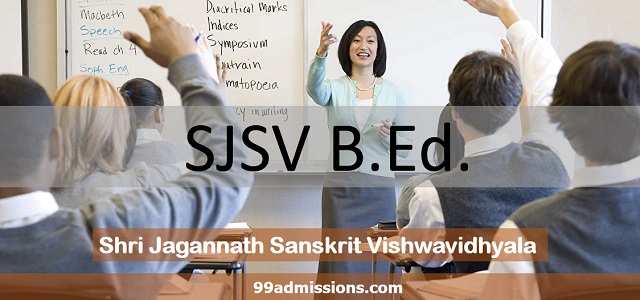SJSV B.Ed 2023: Shri Jagannath Sanskrit Vishwavidhyala (SJSV) releases the application form for B.Ed based on the entrance exam for the eligible candidates. SJSV is located in Orrisa. For the admission of SJSV B.Ed, the candidate must apply with the help offline mode. Shri Jagannath Sanskrit Vishwavidhyala B.Ed application form is generally available in the offline mode only. If a candidate wants to apply for this course they must visit the official web portal first & get detailed information about the SJSV B.ED 2023. During the academic year of 2020-21 candidates must qualify for the entrance exam then they will take admission in this course. On this given content applicant check the eligibility, application fee, Admit Card, exam scheme, answer key of SJSV B.Ed 2023.
SJSV B.Ed 2023: Important Dates
| Notification will release | 1st week of January 2023 |
| Last date of the application form | 4th week of Feb 2023 |
| entrance exam date | 1st week of May 2023 |
| Merit list will publish | To be announced |
| Release the date of counselling for admission | To be announced |
Eligibility Criteria
- After qualification in the SSET (Shikshashastri Entrance Test) applying applicant passed Shastri / +3 (Arts) M.A/Acharya or any equivalent examination thereto from a recognized University/acknowledged examining body
- In addition, the candidate studied Sanskrit as a non-traditional stream.
- For this course, candidate have B.A/M. A and a cut off 50% marks in Shastri/+3(Arts)/M.A./Acharya level is essential.
- The applicant’s age should be 20 years in June.
SJSV B.Ed 2023: Application Form
The applicant must open the official portal Shri Jagannath Sanskrit Vishwavidhyala (SJSV) to get the application form. Admission for SJSV B.Ed candidate must apply with the help offline mode. Shri Jagannath Sanskrit Vishwavidhyala B.Ed application form is generally available in the offline mode only. If the candidate wants to apply for this course they must visit the official web portal first & get detailed information about the SJSV B.ED 2023. When the applicant applies for this course then they need to be very precise in the whole application process so that a mistake would not lead to canceling. Before filling the application form applicant have the same needed required Documents such as Self-attested copies of certificates & mark sheets of the qualifying examinations, documentary evidence in support of the reserved categories, recent passport size photographs, Identity Card for SSET.
Application Fee
- Candidates pay Rs 700/- (Rupees Seven hundred) as an application fee.
- Candidate fills the form with caution because due to any discrepancy their candidacies can be canceled anytime.
Exam Pattern
- The shape of the multiple-choice Sikshastri entrance test (SSET) will be composed of question papers.
- For an answer, the OMR sheet will be made available.
- Sikshastri entrance test (SSET) question paper will consist of 200 maximum marks exam and each question will carry one mark.
| Subject | Marks | No. of Questions |
| Sanskrit Language Proficiency | 60 marks | 60 questions |
| Mental Ability | 40 marks | 40 questions |
| General Knowledge ( Current Affairs) | 40 marks | 40 questions |
| Teaching Aptitude | 20 marks | 20 questions |
| Sanskrit Literature (Veda to Contemporary Lit.) | 40 marks | 40 question |
Syllabus
- Sanskrit Language Proficiency: Sandhi, Karaka, Samasa, Taddhita, Dhatu-rupa, Sannadi, Krudanta, Shabdarupa, Avaya, Stri-Pratyaya, Upasarga, Vacyaparivartana
- Mental Ability (Reasoning): Reasoning by Diagram, Date, Month, Day, Numerical Aptitude / Mathematical Aptitude, Human Relations, Direction, Clock in Mirror, Replacing the letter/word, Odd-man out, Logical reasoning
- General Knowledge: Geography, Indian History, Indian Constitution, Indian Politics, Sanskrit Universities / Institutions / Academies, Sports (National / International), Culture, Literacy, Language, Capital of States & Union Territories, Inventions, Awards, General Abbreviations
- Teaching Aptitude: Sanskrit Education, Class-room behavior (student and teacher), Constitutional Rights on Education, Innovations in Education, National Curriculum frame-work, Conceptual (Classroom behavior, Psychology), Commissions and Committees
- Sanskrit Literature: Itihasa (Ramayana & Mahabharata), Darshans, Chhandas, Veda, Upanishads & Purana, Smrutayah (Varna -Ashram – Sanskar), Alankars, Kavyas


P.hd